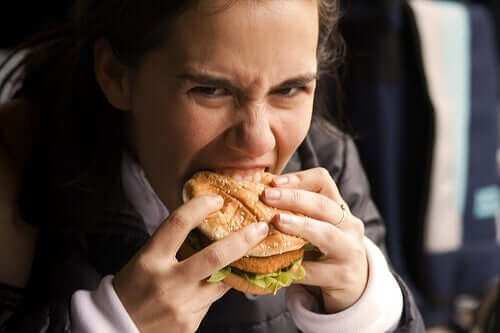Food Cravings: The Irresistible Desire to Eat


Reviewed and approved by the doctor Leonardo Biolatto
Experts in the medical field don’t consider food cravings to be a disease. However, they do constitute a pattern of behavior that can cause health problems or be the manifestation of other underlying disorders. Therefore, when they occur, it’s important to be on alert.
This disorder has to do with a very intense desire to eat certain foods, under specific circumstances. According to estimates, most people exhibit this type of behavior at some time. In fact, according to the available data, up to 97% of women and 67% of men have gone through stages of cravings.
The scientific community doesn’t include them in the category of a disease That’s because they would have to put a person’s health or life at risk. However, with food cravings, this doesn’t happen.
Nevertheless, according to suggestions, those who present these episodes frequently could have some underlying behavioral difficulties and develop health problems.
What are food cravings?

“Food craving” refers to a strong desire and even suggests the presence of an addiction. Therefore, we’re talking about a behavior with addictive features.
Some health professionals point out that it’s not yet received the name ‘syndrome’ or ‘disorder’ simply because the information doing so requires hasn’t been collected. However, several psychologists have reported that they see people for whom food cravings are a severe problem.
Read also: Five Habits for Good Mental Health
Possible causes
The concrete causes of this behavior have yet to be been established. All that’s available is a set of hypotheses on the subject. It’s been possible to establish that ‘craving’ usually has to do with eating something rich in carbohydrates or candy.
One of the hypotheses indicates that the desire to eat sweets and carbohydrates is due to the low levels of serotonin that some people have. This is a neurotransmitter that’s in charge of regulating appetite, sleep, and mood. What’s more, low levels of serotonin are also associated with symptoms of anxiety and depression.
Also, it’s worth mentioning that there are scientific articles that associate the consumption of sugar with the generation of a dependency process, which could intervene in food cravings themselves.
Experts have also established that those with low levels of serotonin develop a tendency to seek out foods that stimulate the production of this substance, to compensate for the deficiency. Sweets and carbohydrates help to replenish their levels.
Serotonin also drops when there are hormonal changes, such as during the menstrual cycle or pregnancy. Likewise, restrictive diets generate a food craving oriented toward the consumption of salty foods. Stress and sadness also seem to influence this pattern of behavior.
Discover: 9 Signs of Low Serotonin Levels
Symptoms and risks

What’s clear is that those who engage in this type of behavior are at risk of developing health problems. The first of these is obesity, followed by diabetes. What’s more, those who suffer from hypertension can also put their health at risk with these compulsive cravings.
If this process were to trigger a situation of obesity, the individual’s health would be at risk. According to research that appeared in the Bulletin du Cancer, being overweight is closely associated with an increased risk of developing complex diseases such as cancer.
From a psychological point of view, there are also risks. This type of behavior tends to produce guilt and feelings of low self-esteem, because of the lack of control that they imply. They can also intensify and lead to eating disorders such as anorexia and bulimia.
Go to a specialist if you suffer from food cravings
Food experts advise eating five meals a day to avoid these sudden cravings. Thus, our metabolism remains dynamic and the sensation of hunger is prevented. It also prevents glucose levels from dropping and the desire for carbohydrates and sweets from increasing.
It’s also advisable to have healthy snacks on hand, such as fruits, whole grains, and foods rich in fiber. Furthermore, you should avoid the consumption of coffee, since it produces nervousness, as well as the ingestion of alcohol, which acts as a depressant of the nervous system.
Likewise, it’s highly recommended to practice exercise regularly, if possible along with relaxation techniques. It’s always important to visit the doctor to rule out any physical problem that could be the cause of the issue.
All cited sources were thoroughly reviewed by our team to ensure their quality, reliability, currency, and validity. The bibliography of this article was considered reliable and of academic or scientific accuracy.
- DiNicolantonio JJ., O’Keefe JH., Wilson WL., Sugar addiction: is it real? a narrative review. Br J Sports Med, 2018. 52 (14): 910-913.
- Salaun H., Thariat J., Vignot M., Merrouche Y., et al., Obesity and cancer. Bull Cancer, 2017. 104 (1): 30-41.
This text is provided for informational purposes only and does not replace consultation with a professional. If in doubt, consult your specialist.








